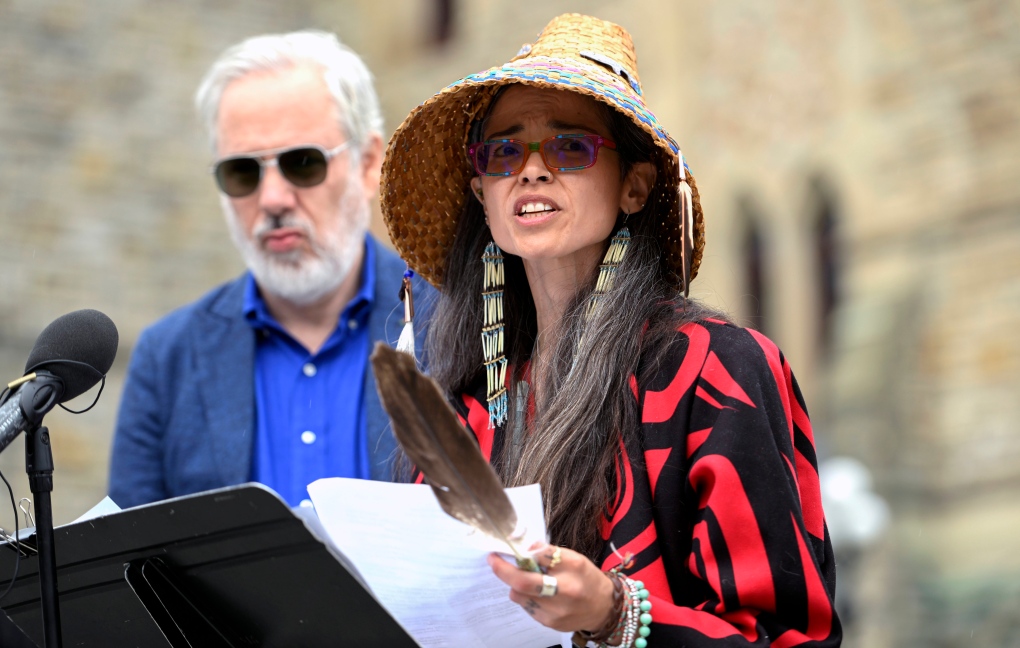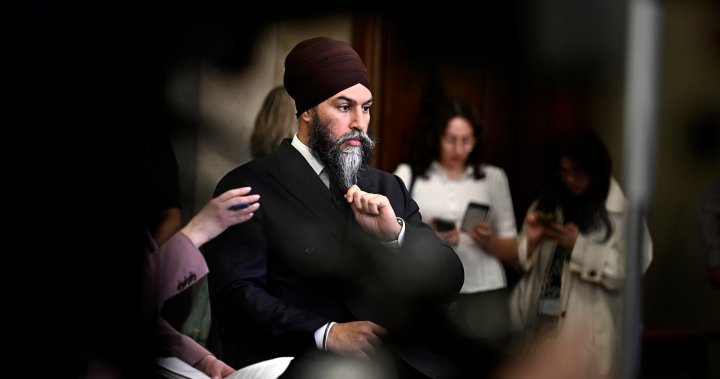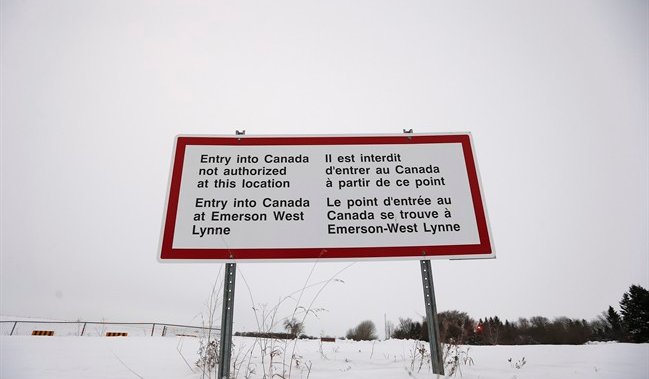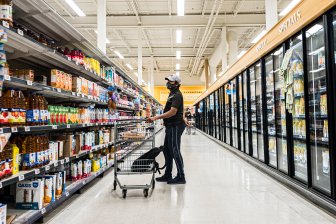Many people, including Canadian politicians, are still trying to come to grips with the fact that a family of four with two children froze to death while trying to cross the border from Canada into the United States last week.
But those who understand human migration best say it was only a matter of time before someone died. Years of warnings about restrictive border measures and criminalization of migrants have fallen on deaf ears, they say.
“This time it wasn’t frostbite or lost fingers and toes. This time an entire family died,” said Craig Damian Smith, a migration expert and senior research associate at Ryerson University.
“The fact we had to wait for that to happen, that’s the big indictment on the government.”
A 47-year-old Florida man was arrested and charged with human smuggling in Minnesota last week. It’s believed he was involved in organizing the cross-border journey for a group of 11 people that included the four people who died.
But why are migrants willing to take such extraordinary risks?
Underlying the issues of human smuggling are two key factors that drive migrants to make dangerous, often life-threatening journeys: an often desperate desire to make a better life for themselves and their families and restrictive immigration policies in countries like Canada and the U.S. that make it virtually impossible for them to do so legally.
“All the advocacy organizations and all the academics have been saying that with this type of immigration and border control, eventually, somebody is going to die,” Smith said.
A border marker is shown just outside of Emerson, Man. on Thursday, Jan. 20, 2022. THE CANADIAN PRESS/John Woods.
JGW
Not a lot is known about the four people who died last week while trying to enter the U.S. They’re presumed to be from India. Two of them were adults. One was believed to be a teenager, and the other was a young child. It’s unclear if they had legal status in Canada — visitor visas, work or study permits — but it’s almost certain they didn’t have authorization to enter the U.S.
Smith said the two main reasons people cross the border from Canada to the U.S. at unofficial points of entry are they were barred from entering the U.S. before or they’re failed asylum seekers in Canada trying to avoid deportation.
A migrant who was part of the group, which included the four people found dead, but survived the trip told U.S. law enforcement officials that he entered Canada on a fraudulent student visa and had no intention of studying in Canada. Police say his plan was to enter Canada and then cross into the U.S. so he could travel to his uncle’s home in Chicago.
Various reports in Indian newspapers over the weekend said the family that died traveled to Canada 10 days ago on visitor visas with plans to enter the U.S.
Read more:
More details emerge in Manitoba smuggling deaths; suspect being held in Grand Forks, N.D.
Smith acknowledges he doesn’t have all the facts about this particular case, but in general, he said, it’s prohibitive immigration policies that are responsible for creating the illicit market for moving people across international boundaries. This includes policies such as the Safe Third Country Agreement between Canada and the U.S., which forbids most asylum seekers from crossing the border, in either direction, at official points of entry,
The more difficult governments make it for migrants to cross borders, the more perilous and life-threatening the journeys they take, Smith said. If governments increase enforcement efforts at known crossings, such as the Emerson crossing in Manitoba, Roxham Road in Quebec, or along the Rio Grande between Mexico and the U.S., migrants and smugglers will shift to more isolated areas to get across.
“It’s basic economics that if you have high demand and prohibition, you’re going to create an illicit market,” Smith said.
Smith said governments typically respond to the kind of tragedy and loss of life seen in Manitoba by blaming smugglers. He said they create a narrative that people are taken advantage of by nefarious criminals, rather than looking inward at their own immigration policies and considering whether these policies are, at least in part, to blame for the deaths.

This was the response of Britain’s Home Secretary, Priti Patel, in November when 27 migrants died while attempting to cross the English Channel between France and the U.K. Patel said “evil” smugglers were responsible for the deaths. She vowed that Britain would “smash the criminal gangs” responsible for the crossings.
But the United Nations High Commission for Human Rights responded to the tragedy by saying the deaths were caused by a “lack of safe pathways, restrictive immigration policies (and) exploitation.”
“This is 100 per cent the narrative from governments … that predatory smugglers, criminal actors are the cause of these deaths,” Smith said.
Prime Minister Justin Trudeau responded to the freezing deaths by saying it was a “mind blowing” tragedy.
At a press conference held two days after the bodies were found, Trudeau said the government is doing everything it can to discourage people from crossing the border in an “irregular or illicit way.” He also said the government is working closely with the U.S. to stop smuggling and help people who are taking “unacceptable risks.”
“It was an absolutely mind-blowing story. It’s so tragic to see a family die like that, victims of human traffickers,” Trudeau said. “People who took advantage of their desire to build a better life.”
Vilifying migrants increases risk
Migrant deaths at the Canada-U.S. border may be unusual, but they’re not unheard of.
A 30-year-old Dominican man drowned in 2019 while attempting to enter the U.S. on foot in a wooded area in southern Quebec.
It’s believed he became disoriented while fleeing U.S. border agents who spotted the group he was traveling with as they crossed the border. He was found dead the next day by Quebec provincial police in a marshy area with his boots on his hands. The Washington Post reported he was trying to enter the U.S. to see his daughter after he was denied a visitor visa.
A 57-year-old Ghanaian woman also died of hypothermia while trying to cross the border between Minnesota and Manitoba in 2017. It’s believed she was planning to make an asylum claim once she arrived in Canada.
Since 2017, roughly 60,000 people have crossed north into Canada at unofficial border crossings to make refugee claims.
Fearing for their safety at home, but unable to get permission to enter Canada, migrants apply for travel permits to the U.S. and, if approved, make their way to northern states, such as New York, Vermont and Minnesota, where they cross the border on foot at unofficial points of entry.

Politicians and pundits on all sides of the political spectrum have vilified migrants, calling them “bogus” refugees and claiming they cross the border “illegally.”
This rhetoric proliferates despite the fact that, according to Canadian immigration law, it’s not illegal to cross the border at an unofficial point of entry for the purpose of making an asylum claim. More than half of these so-called “bogus” refugees have also been approved for refugee protection by independent adjudicators since entering Canada.
Politicians, such as former Conservative leader Andrew Scheer, have pointed to asylum seekers in an attempt to score political points. On multiple occasions, including during a 2019 election debate, Scheer insisted anyone who crossed the border at an unofficial point of entry was “jumping the queue” and taking the rightful place of refugees waiting their turn in overseas camps.
But this political spin ignores the reality that Canada’s immigration system has long differentiated between asylum seekers who show up at the border and those who live in overseas camps. The hyperbole also ignores the fact that Canada is obligated under international and domestic law to consider the claim of everyone who shows up at the border.
“There’s a criminalization of migration context going on, both in policy and in law. And there’s a lot of discourse and language that vilifies people who are trying to move,” said Christina Clark-Kazak, a professor at the University of Ottawa who specializes in discrimination in migration policies.
“Because there is this criminalization of migration, and because it’s becoming more and more restrictive to cross borders, people do have to turn to irregular methods.”
And it’s not only right-leaning politicians who use divisive language to describe asylum seekers. Liberal cabinet minister Bill Blair accused refugee claimants who enter Canada at unofficial points of entry of “asylum shopping” in 2019. These remarks were made at a time when the Liberals, just months away from an election in which the recent spike in refugee claims became a major issue, were tightening border restrictions on asylum seekers trying to enter Canada from the U.S.
Blair’s comments were widely criticized by refugee advocates and legal experts. Former Liberal immigration minister Llyod Axworthy said Blair’s comments were “offensive.”
Smugglers are ‘easy scapegoats’
The idea that governments share responsibility for tragedies like the one that occured in Manitoba may seem novel, but migration experts have been saying it for decades.
Luin Goldring, a sociologist at York University who studies the rights of citizens and non-citizens, said it’s important to understand why some migrants, often from low-income countries, pay smugglers thousands of dollars to enter countries like the U.S. and Canada, while migrants from wealthier, more privileged countries get visas with ease or don’t require visas at all.
“You have these situations that make unrestricted mobility a fantasy for many people. It’s just not possible,” Goldring said.
But cracking down on smugglers at the border isn’t going to stop people trying to enter the U.S. or Canada, Goldring said. It only pushes these activities further into darkness, making the cross-border trips more dangerous and more expensive.
“You could just as easily flip the question and rather than saying why do people keep doing this, ask why do governments keep trying to stop it? Why do they use measures that make people more and more vulnerable?” Goldring said.

A long line of Liberal and Conservative governments have said it is important to stop the flow of unauthorized migrants entering Canada to protect national security and to preserve the integrity of Canada’s immigration system.
But the vast majority of people who cross the Canada-U.S. border at unofficial points of entry don’t have a criminal past and aren’t connected to dangerous organizations.
A 2019 Global News investigation found that 140 of 45,000 migrants — just 0.3 per cent — who entered Canada at unofficial points of entry between 2017 and 2019 had a “serious criminal” past, which means they committed a crime punishable by up to 10 years in prison.
Global News asked the government to respond to claims its immigration and border policies are responsible for creating the circumstances that fuel human smuggling.
A spokesperson for Immigration Minister Sean Fraser forwarded comments made by the minister during an interview with CBC on Friday afternoon.
Fraser said the deaths are “heartbreaking” and bring into focus the perils of irregular migration. He also said human smuggling is dangerous and illegal and has no place in Canada.
“There’s an investigation underway and I personally intend to follow it closely,” Fraser said. “To make sure that, to the extent we can learn lessons to prevent this from happening again, we do.”
Read more:
Tragic incident means ‘serious conversations’ with Canada’s government needed: India Association
For Goldring, the circumstances that surround the deaths of the four migrants in Manitoba are tragic but not unexpected. She said it’s entirely predictable that people will die when crossing the border.
The best thing Canada and other countries can do to prevent these kinds of deaths is to be welcoming to migrants — not just those deemed politically acceptable — and help improve conditions around the world so people don’t feel compelled to leave their home countries.
Goldring also said governments need to stop classifying people “according to our ideas of deservedness” and start facilitating the safe movement of people, whether we agree with their reasons or not.
“We can go on about borders and the policies and all this stuff, but it’s real people who freeze and it’s real people who are subject to incredible amounts of risk,” Goldring said. “Blaming them for poor decision-making or blaming smugglers … isn’t going to fix it.”
© 2022 Global News, a division of Corus Entertainment Inc.










More Stories
Why did the U.S. TikTok ban bill get packaged with foreign aid?
Peguis First Nation launches $1B flood damages lawsuit against feds, province and 2 municipalities | CBC News
Cuba apologizes to Canada for delivering wrong body to grieving Montreal family | CBC News